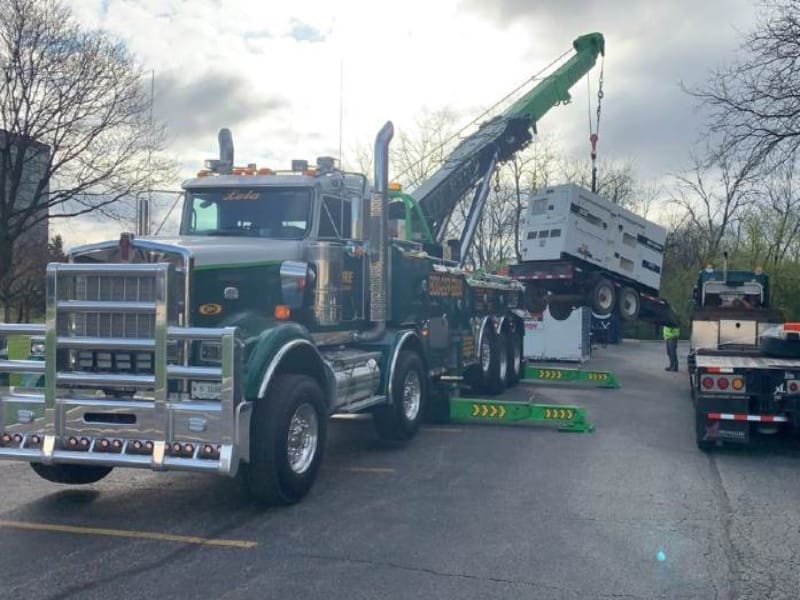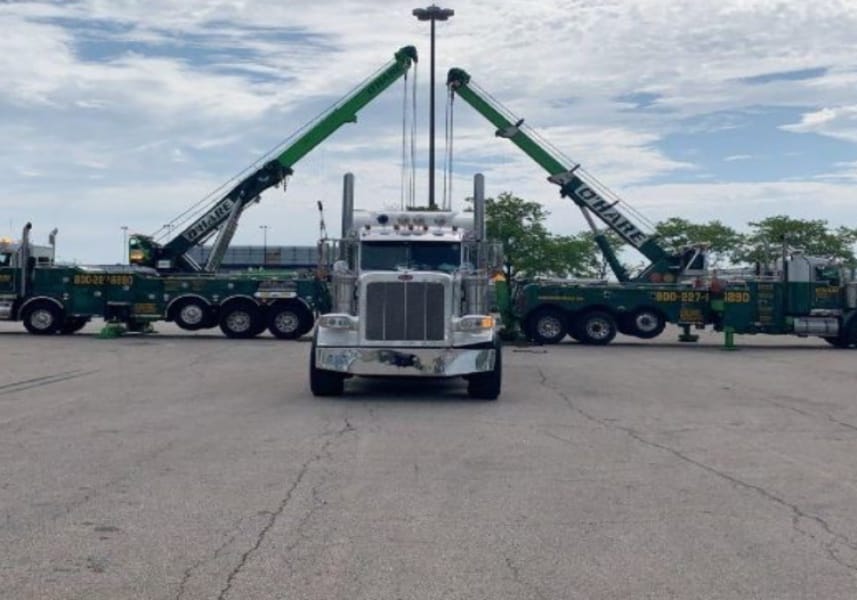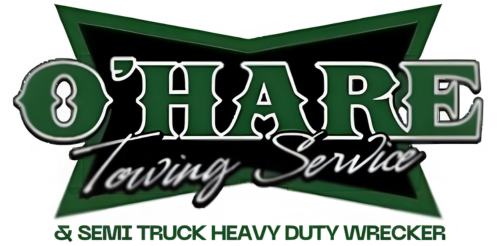Towing Limits Aren’t Just Numbers
Ever loaded up a trailer and assumed your truck could handle it? That assumption can go wrong fast. Towing capacity is a critical detail that drivers overlook until their truck is overheated or stuck on the shoulder. We see it all the time during Downers Grove emergency towing calls.
Let’s break down what towing capacity means and how to calculate it safely.

When Loads Get Too Heavy
Getting your towing capacity wring, can cause vehicles losing control going uphill or failing to stop in time on a descent. Many of these situations start with a trailer that was too heavy. Overloaded setups lead to transmission damage, brake failure, and trailer sway. These issues often come up when the driver didn’t know their limits.
What Towing Capacity Really Means
Towing capacity is the maximum weight your vehicle can pull. This includes everything: the trailer, its contents, the vehicle’s passengers, and any gear inside.
Manufacturers test each model’s limits and assign values based on engine strength, chassis structure, and braking ability. But the number listed in your manual isn’t the only figure that matters. A safe towing setup also depends on the hitch, axle rating, and real-world weight distribution.
You’ll want to pay attention to:
- Gross Vehicle Weight Rating (GVWR): Total allowable weight of your loaded vehicle.
- Gross Combined Weight Rating (GCWR): Max total of your loaded vehicle and trailer combined.
- Curb Weight: What your vehicle weighs without any passengers or cargo.
- Tongue Weight: How much downward pressure the trailer applies to the hitch.
How We Calculate Towing Capacity
We use a straightforward formula. It starts with the GCWR. From that, we subtract the actual weight of the loaded vehicle. What’s left is the amount the vehicle can tow.
Here’s an example. A vehicle has a GCWR of 14,000 lbs. Once it’s loaded with people and cargo, it weighs 6,000 lbs. That leaves 8,000 lbs of potential towing capacity, only if the hitch and suspension can support it.
We verify these numbers before moving heavy trailers or equipment. It’s a habit that prevents breakdowns.
What Goes Wrong Most Often
We’ve handled more Downers Grove emergency towing calls than we can count that started with someone misjudging weight.
Drivers often rely on what they heard online or what a friend told them. Some skip the math entirely. Others forget to include the weight of passengers or cargo when figuring out their load.
Incorrect hitch types show up often. Trailer brakes are sometimes missing or untested. These missteps lead to swaying trailers, overheated engines, and vehicles that can’t brake effectively.
Avoid Common Towing Mistakes
Before any trip, check the following:
- Review the towing limits in your vehicle’s manual.
- Weigh your vehicle once it’s loaded with passengers and gear.
- Match the trailer and hitch class correctly.
- Make sure trailer brakes are installed and functional.
- Check tire pressure on both the trailer and tow vehicle.

Downers Grove Emergency Towing FAQ: Understanding Towing Capacity
1. What is towing capacity?
Towing capacity is the maximum weight your vehicle can safely pull, including the trailer, its cargo, your passengers, and any gear inside your vehicle. Exceeding this limit strains your engine, transmission, and brakes, increasing the risk of breakdowns or accidents.
2. Why is towing capacity so important?
Overloading a vehicle can lead to trailer sway, brake failure, and overheating. These problems often result in roadside emergencies that require professional towing. Knowing your limits prevents dangerous situations and protects your vehicle.
3. What key weight ratings should I know before towing?
- GVWR (Gross Vehicle Weight Rating): Max weight of your fully loaded vehicle
- GCWR (Gross Combined Weight Rating): Max weight of your loaded vehicle plus trailer
- Curb Weight: Weight of your empty vehicle
- Tongue Weight: Downward pressure the trailer places on the hitch
4. How do I calculate my vehicle’s safe towing limit?
Start with the GCWR listed by your vehicle’s manufacturer.
Subtract your vehicle’s actual loaded weight (including passengers and gear).
The remainder is your maximum allowable trailer weight — as long as the hitch and suspension can support it.
5. What’s a common mistake drivers make when estimating towing capacity?
Many drivers forget to include the weight of passengers, fuel, and cargo inside the tow vehicle. Others use the wrong hitch class or overlook the need for trailer brakes. These oversights lead to unstable towing setups and frequent breakdowns.
6. How does improper weight distribution affect towing?
Unevenly loaded trailers can cause trailer sway, poor braking, and reduced steering control. Balanced loads keep the trailer stable and reduce stress on the tow vehicle.
7. What role does tongue weight play in safe towing?
If the tongue weight is too light, the trailer may sway. If it’s too heavy, it can overload the rear axle and affect braking and steering. The ideal tongue weight is usually 10–15% of the trailer’s total weight.
8. How often should I check my trailer brakes and tires?
Trailer brakes and tire pressure should be checked before every trip. Properly functioning brakes and correctly inflated tires are critical for stopping power and stability, especially on long hauls or steep grades.
9. What should I do if I suspect I’m towing more than my vehicle can handle?
Stop and re-evaluate your setup immediately. Continuing with an overloaded or unbalanced trailer increases the chance of a breakdown or accident. If needed, call a professional towing service for assistance.
10. Why call O’Hare Towing Service for Downers Grove emergency towing?
Because we:
- Respond quickly to overloaded or disabled towing setups
- Know the routes, weight limits, and safety protocols in the Downers Grove area
- Bring the right equipment and trained operators to handle heavy or unstable loads
- Focus on safe heavy duty towing and recovery to get you back on track fast
Downers Grove Emergency Towing: O’Hare Towing Service Handles Overloaded Setups Daily
At O’Hare Towing Service, our Downers Grove emergency towing crew helps people out of towing trouble every day. We know the routes, the weights, and the risks. Our Downers Grove emergency towing team shows up ready for whatever mess a miscalculated load caused.
Before your next haul, calculate everything. If you’re unsure, check the manual or give us a call. And if things go sideways, we’ll respond fast. Our trucks, operators, and tools are ready for anything.
Downers Grove emergency towing is about fast decisions, solid prep, and safe recoveries. That’s what our Downers Grove emergency towing team does best.
